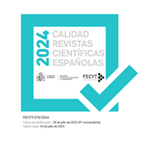Metalenguaje en el tratamiento de las denominaciones y valores de las formas cantaría y habría cantado en un corpus de gramáticas de ELE
Resumen
La explicación del sistema verbal del español en los materiales didácticos, entre los que se incluyen las gramáticas, sigue multitud de enfoques y de técnicas. Para hacer referencia a las formas canónicas cantaría o habría cantado, encontramos en estas gramáticas multitud de etiquetas o denominaciones (condicional simple, condicional imperfecto, potencial…; antepospretérito, condicional compuesto, condicional pasado…). Entre los usos de estas formas verbales (suposición, cortesía, etc.) también se encuentra sinonimia en la terminología empleada. Este artículo analiza empíricamente la terminología usada para hacer referencia a las formas verbales en -ría, así como a sus valores, en un corpus de 30 gramáticas de español como lengua extranjera. Para ello, se sigue un enfoque cuantitativo. Los resultados sugieren multiplicidad de denominaciones y valores: es posible hallar cierta coherencia en la conceptualización de la forma verbal desde la terminología empleada y una preponderancia de los valores no prototípicos frente a los prototípicos.
Descargas
Descarga artículo
Licencia
La revista Círculo de Lingüística Aplicada a la Comunicación, para fomentar el intercambio global del conocimiento, facilita el acceso sin restricciones a sus contenidos desde el momento de su publicación en la presente edición electrónica, y por eso es una revista de acceso abierto. Los originales publicados en esta revista son propiedad de la Universidad Complutense de Madrid y es obligatorio citar su procedencia en cualquier reproducción total o parcial. Todos los contenidos se distribuyen bajo una licencia de uso y distribución Creative Commons Reconocimiento 4.0 (CC BY 4.0). Esta circunstancia ha de hacerse constar expresamente de esta forma cuando sea necesario. Puede consultar la versión informativa y el texto legal de la licencia.











